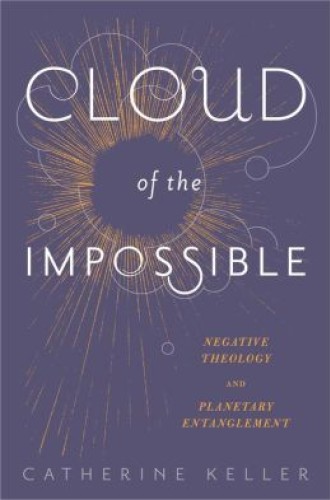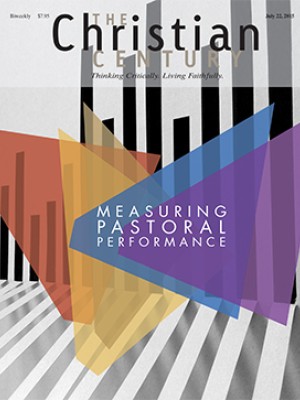Cloud of the Impossible, by Catherine Keller
Even if we do not always recognize it by name, process theology has become one of the most important theological movements in American Christianity. The work of Catherine Keller has been fundamental in this development. From her position at Drew University, Keller has woven together a politically and ecologically concerned theology that is conversant with both contemporary philosophy and some of the most recent developments in the sciences. This often makes for difficult and dense reading, and her bewildering and creatively beautiful body of work is often more poetry than prose. But it is always worth the effort.
Keller’s most recent work continues her theopoetic project. Folding without collapsing together the negative theologies of the Pseudo-Dionysius; the anonymous Cloud of Unknowing; the works of Nicholas of Cusa; the unspeakable entanglements of quantum physics; the philosophies of Judith Butler, Gilles Deleuze, and Alfred North Whitehead; the democratically and sensually embodied poetry of Walt Whitman; and the thought of a host of political theorists and ecological ethicists, Cloud of the Impossible takes up the dream of the World Social Forum in Porto Alegre that “another world is possible.” To borrow a phrase from John Caputo, for Keller this dream theology is “not what we say about God but how we do God,” in a way that is “materializing in and beyond speech a love-relation to your widest world.” In love, it seems, another world might be possible.
Read our latest issue or browse back issues.
This is quite heady stuff, and for those of us who have a stake in process theology it is very exciting. Here is process theology as maker of worlds—worlds that are more loving, just, and peaceful, and maybe a little more beautifully sacred. But Keller quickly warns us against premature enthusiasm. A relational theology is possible today because the world we live in—this world of wars and violence, economic exploitation, and ecological collapse—is already a relational world. If process theology thinks the possibility of our relations, globalization is the practice of our relations. As Keller observes, economic globalization “entangles everything.” In its primary meaning, Keller argues, globalization “signifies the neoliberal corporate economics” of oil and is leaving in its wake an interconnected world that is suffocating and strangling “the shared life of creatures.” For many in this relational globalized world, it is becoming impossible to breath.
So it is not enough to propose a relational world; we already have one. What is needed is for this relational world to be pried open.
In the interest of such openings Keller turns to the tradition of negative theology and the impossible mystery of God. In the work of the 15th-century theologian Nicholas of Cusa, the apophatic unsaying and unnaming of God in the presence of God’s mystery leads to a final naming of God as posse ipsum, possibility itself. For Keller, Nicholas of Cusa’s negative theology and its continual repetition “God is not” offers not “mastery over the mystery” of God but an intensification of mystery. And this intensification becomes an opening of our relations with God to the mystery of infinite possibility, to the mysterious possibility that all things are possible.
In a wonderful turn to scripture, Keller traces this posse ipsum to its “dark precursor” in the cloudy presences of God: the mysterium tremendum of God’s appearances with Israel. As the cloud of glory calling Moses up Mount Sinai and the pillar of cloud guiding Israel across its own desert, God is wont to appear as an enveloping presence that cannot be grasped. And though this presence may at times inspire awe and terror, it is also, Keller recognizes with the aid of midrashim, the appearance of “love, harmony, and intimacy. . . . Neither material nor immaterial, both awful and intimate, this heaven was read, amidst circumstances of migrant risk and perpetual diaspora, to offer safe haven.” From within this safe haven, this cloudy tabernacle, all things become possible again.
Today this tabernacle can no longer be simply for us. Clouds cannot be so closely kept. Returning again to Nicholas of Cusa, Keller offers this proposition of the mystery of God-the-impossible-cloud as Creator: “If God is unfolded in everything and everything enfolded in God, then the ‘everything’ of the universe as a whole is the way God is in every thing.” How else to understand the misty mystery of a cloudy God’s creating than the unfolding and enfolding of everything it is present to? But then our relations with God are no longer so simple: “If God is in me, it is me-with-the-whole-universe attached,” which quickly, for Nicholas of Cusa and for Keller, becomes a panentheism of cloudy creativity—or rather a pan-incarnation of the ubiquitous embodiment of God in all. The infinite mystery, creating all, now also residing in all, becomes the possibility of all.
After all this mystery, it would be tempting to read Keller’s turn to science as a return to surer ground. Thankfully, she does not give in to the cult of facts but remains within the mystery that any vibrant scientific practice must confess. Not to be confused with doubt or denial, scientific mystery resides in the gap between experimental practice and theoretical knowledge. Specifically, Keller is interested in the mysteries of quantum mechanics, the physics of a cloudy world where indeterminacy, “spooky action,” and entanglement are becoming more real than any objective facts we can imagine.
It is imagination Keller is after, the poet remaining a poet even when reading physics. For the gap in any scientific knowledge is there to be filled not by God—“What kind of God-entity plugs gaps anyway?”—but by imagination, to inspire us into the mystery of our own being. Keller offers this theo-scientific lesson: “Oddly, the quantum relationality turns the creation into such a mysteriously relational field as to make credible again . . . an intimate relation to its source. If that creative source is no longer conceivable as omnipotently producing a world and directing it to its End, it may be imaginable (theologically speaking) as unfolding in and through that world, as in its own flesh.” The flesh of our flesh, the flesh of the world, as God’s flesh.
With this it seems that Cloud of the Impossible is less interested in negative theology, quantum physics, or philosophy than in the mystery of our own fleshy being: the impossibility that we name love. Without offering a Christology, and after more talk of God than she seems comfortable with, Keller proposes a theology not of relations or process, but of this final impossible possibility, the infinite mystery of love, the final ground of any possible world.







